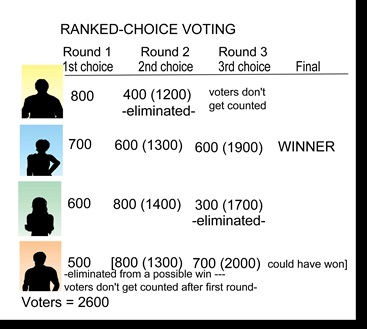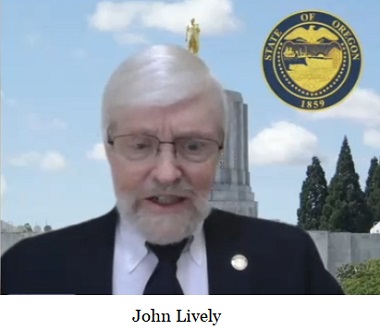Bill summary deceives public by not mentioning ranked choice voting
Oregon
House Bill 3166 will replace the general election with ranked choice voting. Perhaps Representatives John Lively (D-Springfield) and Paul Evans (D-Monmouth), chief sponsors, are trying to deceive voters by not mentioning it in the bill summary. Instead, they focus on primary changes naming it a ‘unified primary,’ otherwise known as an ‘open primary.’
However, voters are seeing through the word games and are looking at it as an end run around their vote. Voters voted down ranked choice voting for primary elections by nearly 60% in 2024 and 90% of current testimony are voicing their objection to this bill. It’s presumptuous to think voters would accept the process for the general election when they clearly rejected it for the primary in 2024.
HB 3166 would require all candidates be on the same primary ballot for partisan and nonpartisan offices, regardless of political party affiliation or nonaffiliates. All candidates would appear on the same unified primary election ballot, with the top five candidates receiving the most votes advancing to the general election ballot. It does not apply to candidates for President and Vice President of the United States.
Even the national Open Primaries group does not support the method proposed in HB 3611. Perhaps the sponsors don’t recall that it was their party that introduced primary elections in the early 20th century. Prior to this, candidates were often selected in back-room deals by party bosses or through congressional caucuses, without much public involvement.
It was the tumultuous Democratic National Convention in 1968, which called for more open nominating process led to reforms that strengthened the role of primaries. Primaries are an electoral reform designed to give the people greater control over the selection of candidates in their party. Section 38 of HB 3611 is a throwback to selection by party bosses or caucuses.
Minor parities should object because it requires them to compete in the primary in order to be in the general election. With the numbers in the two major parties and nonaffiliates, it would take a strong candidate to make it to the general election. Currently, qualified minor parties can nominate a candidate for the general election by holding a primary convention. The bill changes their convention to who they endorse for the primary.
The primary election was designed for major parties to select the candidate they would send to the general election. It became an issue when Oregon adopted automatic voter registration in 2015, which includes provisions for nonaffiliated voters. Because the process doesn’t require confirmation of the registration, which populates the nonaffiliate voter rolls, they have grown to be equal to a majority party without the option to vote in the primary. Both major parties have refused to allow them to vote in their primaries, possibly swaying the parties election.
A D V E R T I S E M E N T

A D V E R T I S E M E N T

The most egregious to voters is Section 40 of HB 3611, which adopts ranked choice voting for the general election for the five top candidates from the primary open election. The bill doesn’t include the process, but leaves it to the Secretary of State to determine the process by rule. Clearly a violation of the U.S. Supreme Court Chevron decision, which directs government not to delegate their powers.
The bill further moves the primary election day to the second Tuesday in March for Presidential elections, but appears to allow the Secretary of State to change the date to not later than the first day of September.
There isn't a state that has tried ranked-choice voting, that one or more elections produced a false win and some took months to discover. This will never give Oregonians confidence in their voting system. If you’re an offended voter, email the
House Committee on Rules and
Legislators.
--Donna Bleiler| Post Date: 2025-03-24 13:57:25 | Last Update: 2025-03-25 00:33:07 |








 The most egregious to voters is Section 40 of HB 3611, which adopts ranked choice voting for the general election for the five top candidates from the primary open election. The bill doesn’t include the process, but leaves it to the Secretary of State to determine the process by rule. Clearly a violation of the U.S. Supreme Court Chevron decision, which directs government not to delegate their powers.
The most egregious to voters is Section 40 of HB 3611, which adopts ranked choice voting for the general election for the five top candidates from the primary open election. The bill doesn’t include the process, but leaves it to the Secretary of State to determine the process by rule. Clearly a violation of the U.S. Supreme Court Chevron decision, which directs government not to delegate their powers.